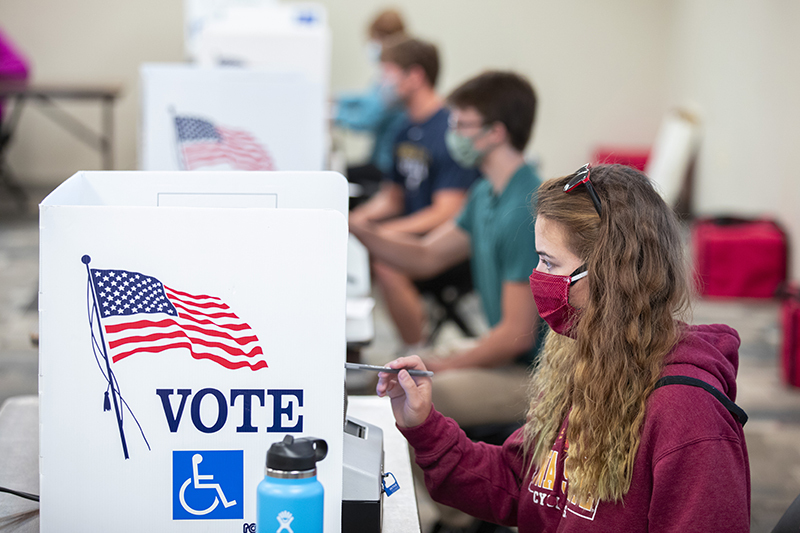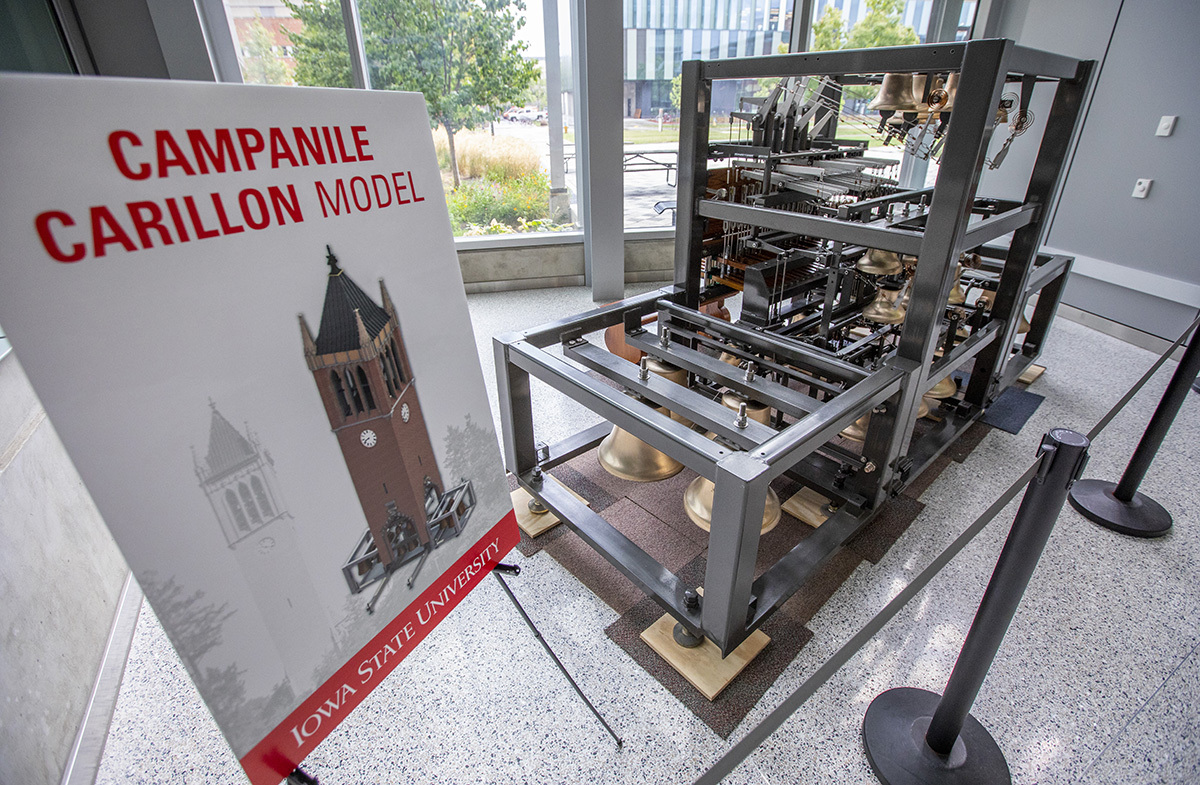
Senior Anastasia Golter of Minneapolis votes alongside others in Room 004 of the Scheman Building on Oct. 12, the first of four days before the Nov. 3 general election when Story County is holding satellite voting there. Photo by Christopher Gannon.
With the Nov. 3 general election nearing and the Iowa legislative session starting in the spring, it's a good time for faculty and staff to review how constitutional protections, state law and university policies relate to politics.
Here are some tips from the university counsel’s office and the senior vice president and provost’s office:
Speech rights are personal
The most important thing to remember is that Iowa State employees may participate fully in political activities, provided they are acting on their own behalf and using their personal time and resources. They can support or oppose candidates and legislation, write letters to the editor or even run for office.
Early voting is underway
In-person voting in the Nov. 3 general election began this week at satellite polling locations and the Story County administration building in Nevada. Satellite voting will be available Oct. 19 and 21 at the Scheman Building from 9 a.m.-4 p.m. It's also available every weekday at the county administration building and on every Saturday in October at the Ames Public Library. All eligible Story County voters can cast an absentee ballot in person at any early voting satellite polling location.
Concerns arise if faculty and staff create the impression they are acting or speaking on behalf of the university or using public resources to engage in political activities. Unless explicitly authorized, faculty and staff do not speak for Iowa State and should not imply their opinions represent the university.
Faculty and staff should take care in political communications, such as writing letters to the editor or to elected officials, to use their personal computers and email accounts and not use university letterhead. State law prohibits public bodies and public employees from using public resources for political purposes, and Iowa State policy generally prohibits employees from using university property for a private purpose, such as supporting their personal political views.
Classroom expression
Instances when a public university can prohibit speech based on the message it contains are rare and narrowly defined, due to First Amendment protections. Restrictions on expression must be limited to the time, place and manner in which the viewpoint is shared. Those restrictions must be consistent, imposed regardless of the view expressed. For instance, the university prohibits chalk messages in some areas of campus but not what the messages say. It can remove racist signs placed in areas where posters aren't allowed as long as positive and innocuous signs are removed, too.
In classrooms, instructors can require that students act in a way that maintains an environment effective for learning. Policies and procedures and training resources can help faculty manage disruptive students. But in the same way that chalking rules can't consider what's written on the sidewalk, classroom expectations for students must be reasonable, content-neutral and consistent. Instructors can't bar students from expressing opinions on topics discussed in class, even if those opinions are offensive to others in the classroom. Fact-based teaching and conversation are a good strategy for countering abhorrent views, university counsel Michael Norton said in his Oct. 13 virtual presentation, "Navigating the Public Classroom."
"Just suppressing the speech is not acceptable, and frankly, I don't think it's very effective," he said. "You can't say you're only going to allow a certain viewpoint."
Classroom discussions must remain germane and appropriate, so it's OK to prohibit discussions on matters unrelated to the coursework. But if instructors open the door by talking about an issue, they can't prevent students who disagree from sharing their views, Norton said.
Providing balance
Inviting political advocates to speak to a class may seem like a potentially beneficial opportunity, but there are several important factors to consider. First, discussions of political topics must be germane to the course, so candidate visits must be for an educational purpose related to the class and not for campaign-related activity. Talking about Medicare for All, for example, may be appropriate for a political science course, but it probably isn't in a course in engineering or agronomy.
The other consideration is balance. Federal law requires equal access to the university for candidates or their surrogates. If instructors allow a candidate to visit a classroom, they must allow them all. The same principle applies to advocates and opponents of ballot measures.
Registering students
A voter registration drive may not seem partisan, but it depends on the sponsor. Some may look to maximize registrations from students, faculty, and staff who appear to be supportive of their cause, while avoiding others in the class who may not feel the same way. For that reason, the university discourages faculty from using class time for this purpose.
Questions?
The university counsel's office released guidance earlier this fall on how First Amendment considerations impact student expression and related issues. Employees with specific questions regarding political activities on campus -- including what is permissible and prohibited -- should contact university counsel Michael Norton at 294-5352 or mnorton@iastate.edu.
The Carrie Chapman Catt Center for Women and Politics created a Canvas module to encourage student voting. “Ask Every Iowa State Student to Vote” is current, politically neutral, accurate and available on the Canvas Commons. It provides information for registering and voting in Ames, Story County, elsewhere in Iowa or in another state. It also provides nonpartisan sources for students to research candidates and ballot questions so they can cast informed votes.
Information on student voter registration requirements also is available on the ISU Card website.
Campaign signs and stickers
While banners and signs are generally permissible in students' residence hall rooms, the same does not apply for faculty and staff offices and workspaces. State law generally prohibits displaying campaign signs on or within university buildings.
Displaying political messages in employee workspaces may be permitted as long as they're not conspicuously visible to the public or affixed to equipment owned by the university. The key idea is whether someone might reasonably interpret, correctly or not, that the message is representing the institution. For example, a political sign posted on an outward-facing window or door would be problematic, as would posting a political sticker on a university-owned laptop. Faculty and staff also should consider how displaying political messages may affect expression of diverse or contrary opinions in their offices or classrooms.

